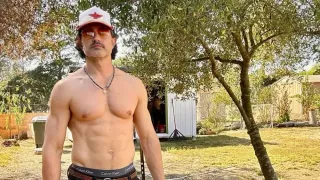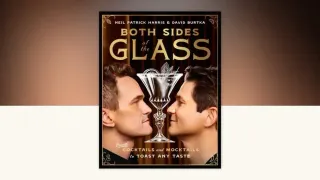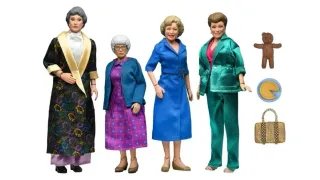November 3, 2016
BARchive :: All Yesterday's (Election) Parties
Michael Flanagan READ TIME: 5 MIN.
On November 8, 2008 there was a moment during the election broadcast on MSNBC that captured the dual nature of election night for the LGBT community. An announcer reported: "I believe we have pictures out of San Francisco as well. Some of the celebration pouring out in the Castro District of the city...."
Rachel Maddow responded: "That may not all be celebration if it's in the Castro... Have you heard anything about Prop 8?"
Yes, there were people pouring out into the street - but no, it was not a celebration. On that night, as on many others, we were torn between joy for President Obama's election and anger over the rollback of our rights. And on that night, as on many others, the question was whether to protest, celebrate or both.
Election night parties have a long tradition in San Francisco. Our bars and clubs have served as the focal point of campaigns since at least 1961, when the Black Cat played host to Jose Sarria. There even used to be a handy source for finding out about the parties: The SF Bay Guardian provided a clip out "superlist" of election night parties.
A decade which is fascinating for the back and forth of wins and losses is the period from 1980 through 1990. It's the period when the city attempted (and eventually succeeded) in moving beyond one gay supervisor representing the Castro and faced multiple challenges to the civil rights of people with AIDS.
Perhaps the saddest of election stories from this decade are the multiple attempts of Pat Norman to become a supervisor in San Francisco. Norman ran three times, in 1984, 1986 and 1988. By all accounts she was a stellar candidate. At the time of her first race she was coordinator for Lesbian/Gay Health Services in the city's Public Health Department and was the first out lesbian candidate for office.
You would think that in the midst of a public health crisis like AIDS that she would be seen as the valuable asset she was - and in fact it's clear many did see that. She launched her campaign at the home of Gay Games founder Dr. Tom Waddell and had a benefit concert at Great American Music Hall with Bobby McFerrin, choreographer and dancer Ed Mock and the Linda Tillery Band.
In that first run, she surprised the political establishment by placing ninth, three spots out from office. In her second race, she used the base of the LGBT community and reached out to the city at large on environmental and development issues.
She had the backing of the Bay Area Reporter and did fundraisers with author Cherrie Moraga and Angela Davis. That time she placed seventh.
By her last run, Norman had become the statewide director of AIDS education training and had been co-chair of the 1987 March on Washington. She had the backing of Cesar Chavez and (then Assembly Speaker) Willie Brown, but she still came in twelfth. Although she continued to work in public service, she never again ran for office.
In a 2007 article about black gays seeking political office, she told B.A.R's Matthew Bajko "Black lesbians apparently are really very frightening to people." I cannot help but feel that her loss was also the city's loss.
In the second half of the 1980s, the state faced four propositions that would have enforced mandatory testing of people considered high-risk for AIDS and quarantine. Proposition 64 was placed on the November 1986 ballot by Lyndon LaRouche and caused a massive statewide mobilization to stop it.
In San Francisco the effort was led by SF-CAN (Community AIDS Network). The reaction of the gay community and their supporters was awe-inspiring. Bars held benefits, one at the High Chaparral honored labor leader Howard Wallace and had entertainment by Tom Ammiano.
There were fundraisers at Ginger's Too, the Kokpit and Trocadero Transfer as well. Sharon McNight was tireless, raising money at bars in the Russian River and doing a fundraiser with Robin Williams at the Hyatt Regency. Frameline had benefit showings of films and fundraisers in private homes on the peninsula raised thousands of dollars.
But support came from unexpected places as well. California Secretary of State March Fong Eu sued the LaRouche campaign over statements that AIDS was easily transmissible. The California Catholic Conference of Bishops released a statement saying the proposition could lead to the spread of the disease. Z Budapest placed a hex on the LaRouche campaign at the annual Spiral Dance. In the end all of the hard work paid off - the proposition was defeated by a four to one margin.
By October 1987, the LaRouche supporters were at it again. They placed Proposition 69 on the June 1988 ballot. This time, however, the community relied largely on statewide health organizations and civil liberty groups to lead the fight. This proposition was defeated 68 to 32 percent.
Proposition 102 was placed on the November 1988 ballot by Congressman William Dannemeyer and would have eliminated anonymous testing and required reporting of people with HIV and contact tracing (notification of people potentially infected). Although it was again opposed by health, religious and civil liberties, it was supported by then-governor George Deukmejian.
It was on the ballot with Proposition 96, which requires testing for anyone "interfering" with a peace officer, firefighter or EMS personnel and reporting of the identity of people suspected of having HIV in jails and prisons.
Proposition 102 was defeated, but 96 passed. The victory party for 102 was moved from the Trocadero to Castro Street to incorporate a protest against the passage of 96.
On November 6, 1990 LGBT San Francisco had good reason to cheer. That night, Roberta Achtenberg and Carole Migden became the first lesbians elected to the Board of Supervisors and Tom Ammiano came in first in a field of ten for a seat as the first gay man on the board of education. Also that night, eight years of work by Supervisor Harry Britt came to fruition when Proposition K ensured domestic partnerships in San Francisco.
In the evening that came to be known as the "Lavender Sweep," there were four victorious election night parties: Achtenberg's at Caf� San Marcos, Migden's at Bahia restaurant, Ammiano's at Bull's Texas Caf� and the Proposition K party at Colossus. The Advocate reported that at Colossus they "danced and wiped away tears of joy."
The November 1990 election had long term effects. Ammiano went on to serve on the Board of Supervisors and both he and Migden went on to the California Assembly. Achtenberg was appointed Assistant Secretary of Housing and Urban Development by President Bill Clinton (memorably being called a "damn lesbian" by Jesse Helms during her confirmation hearings). Proposition K was a step in the inexorable march to marriage equality.
Elections are often emotional affairs for our community and they have been throughout our history. What will it be this year? Will we protest or party? There is only one way to make sure that it is the latter. Make your voice heard. Go out and make some history - vote!






